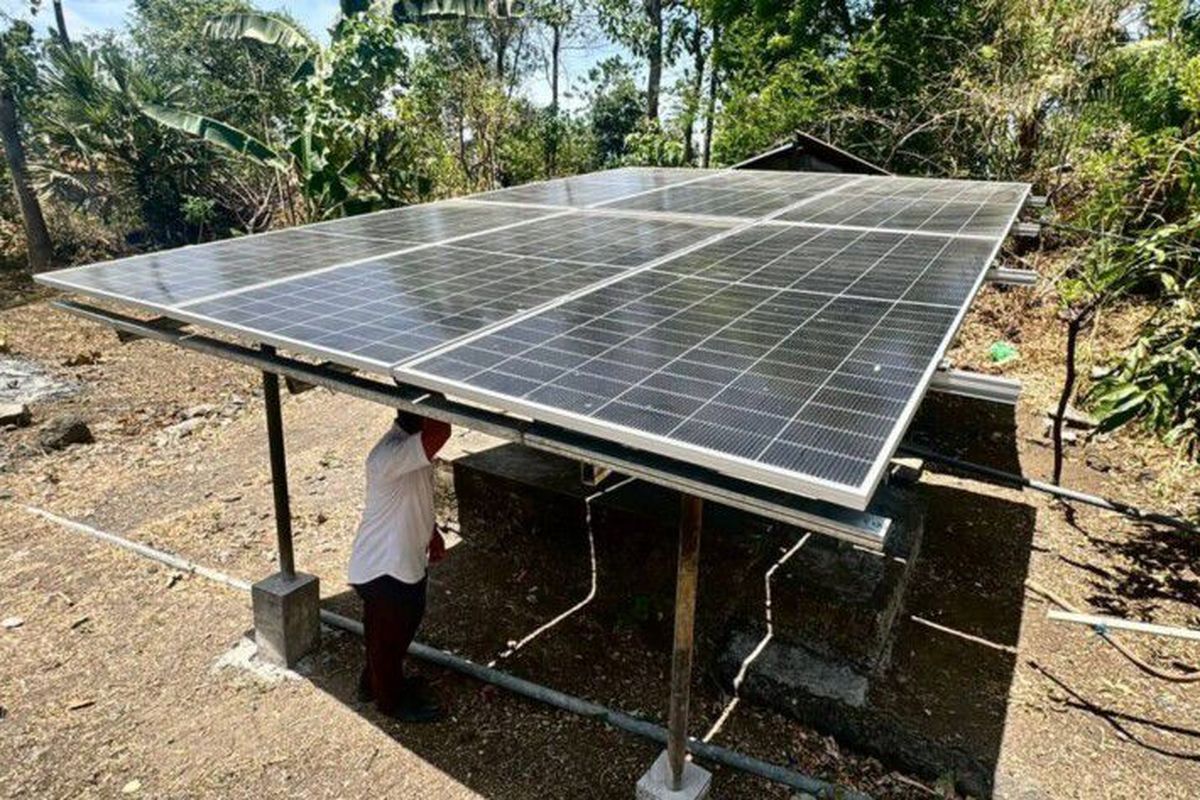Three villages in Bali now have rooftop solar power installations with a total capacity of 15.37 kilowatt peak (kWp) across four locations.
These villages are Banjarasem Village in Buleleng Regency, Baturinggit Village in Karangasem Regency, and Batununggul Village in Nusa Penida District, Klungkung.
The solar power systems were installed by the Institute for Essential Services Reform (IESR) with support from the philanthropic organization ViriyaENB.
IESR CEO Fabby Tumiwa explained, “This infrastructure shows that solar energy is not just about electricity but also has a direct impact on the basic needs of the community, from public services, education, to access to clean water.” (Wednesday, 27/8/2025).
From Consumers to Producers
In addition, Fabby explained that the solar power installations represent an initial step toward achieving Bali’s Net Zero Emissions target by 2045, which was launched by the Bali Provincial Government together with a civil society coalition since 2023.
In Banjarasem Village, a 3.5 kWp solar power system with a 4.8 kWh battery was installed, centered at the village hall as a symbol of clean energy utilization for community activities.
In Baturinggit Village, a solar power system with the same capacity is used to operate water pumps, providing villagers access to clean water.
Currently, a 5.95 kWp solar power system is being installed at the Nusa Penida Subdistrict Office to support public administration services.
Meanwhile, a 2.46 kWp system has been installed at Batununggul State Elementary School to support learning activities.
Fabby explained, “Solar technology is becoming more efficient and affordable, making it more accessible to the community. Maintenance is simple, and the systems can last up to 25 years.”
He hopes that Bali’s villages can become pioneers in transforming from energy consumers to energy producers. “If regulations allow, one day villages could even sell surplus electricity to PLN (the state electricity company),” he added.
According to Fabby, Nusa Penida has the potential to meet 100 percent of its electricity needs from renewable energy by 2030 as long as every household installs solar panels.
Therefore, support from government policies, private investment, and active community participation is essential.
Bali’s Regional Secretary, Dewa Made Indra, acknowledged that the energy transition is not easy.
Communities need to recognize, understand, calculate the benefits, and ultimately decide to switch to renewable energy.
He said, “Usually, once one family tries it, neighbors become curious and interested. From there, the use of renewable energy can spread further.”
The Bali Provincial Government is encouraging all villages to build rooftop solar power plants as part of the renewable energy program.
Besides the three mentioned villages, the government is committed to encouraging similar initiatives in other areas.
Dewa Made Indra emphasized that utilizing solar energy is a strategic initiative aligned with efforts to achieve regional energy independence.
He stressed the importance of providing simple explanations to the public about the benefits and efficiency of solar power systems.
“On behalf of the Bali Provincial Government, I believe replicating this initiative across villages is very important so that villages can actively participate in Bali’s energy independence efforts,” he said (Thursday, 28/8/2025).
Improve Community Welfare
The provincial government continues to strengthen cross-sector collaboration so that the use of clean energy not only meets electricity needs but also improves community welfare in villages.
IESR Executive Director Fabby Tumiwa explained that IESR, together with the Bali Provincial Government, inaugurated the solar installations in three villages simultaneously on Wednesday (27/8/2025) with a total capacity of 15.37 kWp across four locations: Banjarasem (Buleleng), Baturinggit (Karangasem), and two sites in Batununggul (Nusa Penida, Klungkung).
Fabby stated that this is a strategic step to realize village energy independence, support public services, and reduce community electricity costs.
Bali has a solar energy potential of up to 22 GW, but less than 1 percent has been utilized so far.
Besides enhancing public services, the solar power systems in the three villages also support vital community needs, such as water pumps in Baturinggit and learning activities at Batununggul State Elementary School.
The program involves village governments, village-owned enterprises, and community participation with support from the philanthropic organization ViriyaENB as part of the effort to achieve Bali’s Net Zero Emissions target by 2045.
Fabby added, “Renewable energy must be present in village communities’ lives, not only for electricity but also to support the people’s economy and public services.”
Sources: Bali.bisnis, Kompas
Feat Image: via IESR

